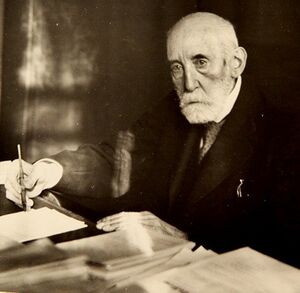Eugène d'Eichthal
French publicist and university administrator (b. 4 November 1844 [N.S.] in Paris; d. 28 February 1936 in Paris), born Eugène Séligmann d'Eichthal.
He was the son of the notable Saint-Simonian publicist and philologist Gustave d'Eichthal (1804–1886) and his wife Cécile (née Rodrigues-Henriquès; 1823–1877), both of whom came from Jewish banking families that had converted to Roman Catholicism. Eugène distinguished himself during his studies at the Lycée Bonaparte (now the Lycée Concordet) in Paris. In his youth he also spent some time in England (1862) and Spain (1864). In 1868, he took up an administrative job at Pleyel et Cie, the most famous piano manufacturing firm in France, where he contributed to improving the situation of the workers.
Over the following years Eugène would prepare a number of his late father's works for publication, including Gustave d'Eichthal's correspondence with the French sociologist Auguste Comte (1798–1857) and the British thinkers John Stuart Mill (1806–1873) and Thomas Carlyle (1795–1881). In 1905, d'Eichthal was elected to the Académie des sciences morales et politiques where he became the doyen of the Political Economy section. Seven years later, he was appointed director of the École libre des sciences politiques — a post which he would hold until his death in 1936. In his book Quelques âmes d'élite (1804–1912) Esquisses et souvenirs (Paris: Hachette, 1919) he provided a series of lively portraits of French intellectuals from both his father's generation and his own, such as the historian Gabriel Monod (1844–1912).
Eugène d'Eichthal was married first to Marie ("Mimi") Bohomoletz (1856–1885), the daughter of the Moscow-born Belgian music-lover and translator Adèle Bohomoletz (d. 1897), and then, after Marie's death, he married, in 1887, her younger sister Adèle Bohomoletz (1862–1889). Marie bore him two children: Henri d'Eichthal (1878–1929) and Juliette d'Eichthal (1880–1945), who in 1903 would marry Marcel Guérin (1873–1948), the father of the French anarchist writer Daniel Guérin (1904–1988). With his second wife d'Eichthal had one daughter, Adèle d'Eichthal (1888–1955), who in 1912 married the museum curator Paul Alfassa (1876–1949). D'Eichthal asked his two daughters Juliette and Adèle to deposit, after his death, his collection of some 5000 documents relating to the history of Saint-Simonianism at the Bibliothèque de l'Arsenal in Paris.
D'Eichthal was a music-lover and could frequently be seen at public and private concerts in Paris. During Tchaikovsky's month-long stay in the French capital in the summer of 1886, d'Eichthal went to the composer's hotel twice to pay his respects but he was only able to leave his visiting card because Tchaikovsky was not in on either occasion [1]. On 12/24 June 1886, the composer wrote a brief note to d'Eichthal to apologise for not having called on him after receiving his visiting card: he explained it was due to "some very complicated family matters" (i.e. his negotiations with the French authorities to ensure that he could take his three-year-old grand-nephew Georges-Léon, the illegitimate son of his niece Tatyana, back to Russia with him so that the boy could be adopted by his brother Nikolay), and, since he had to leave Paris that very evening, he promised to call on him during his next visit to Paris [2]. However, it seems that they did not subsequently meet. Through his mother-in-law Adèle Bohomoletz and her sister Marie Clerc (1840–1915), d'Eichthal also became acquainted with Gabriel Fauré, who dedicated to him his Nocturne No. 6 for piano (1894).
Correspondence with Tchaikovsky
One letter from Tchaikovsky to Eugène d'Eichthal has survived, dating from 1886, and has been translated into English on this website:
- Letter 2972a – 12/24 June 1886, from Paris.
Bibliography
- Le Bret, Hervé. Les frères d'Eichthal, Gustave, penseur saint-simonien, et Adolphe, homme d'action. Leur influence sur l'ouverture à partir de 1830 de la société française aux réseaux financiers et industriels, aux échanges internationaux et aux sciences sociales, PhD thesis in History defended at the University of Paris (La Sorbonne) on 14 December 2007
- Le Bret, Hervé. Eugène d'Eichthal, directeur de Sciences Po de 1912 à 1936, La lettre des études saint-simoniennes, No. 24 (February 2011), p. 5–9.
- Ein neu aufgetauchter Brief Čajkovskijs an Raïssa Boulanger von 1886, sowie seine Briefe an Adèle Bohomoletz von 1888 und 1893, und an Eugène d'Eichthal von 1886 (2012)
External Links
Notes and References
- ↑ Lucinde Braun was kindly informed of the existence of this visiting card by Polina Vaidman, senior curator at the Tchaikovsky House-Museum in Klin.
- ↑ See Letter 2972a to Eugène d'Eichthal, 12/24 June 1886.

